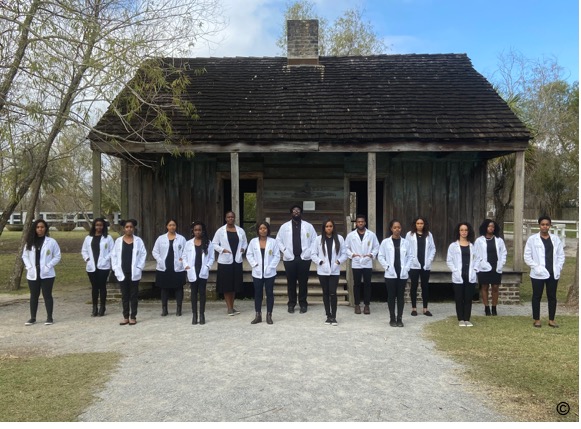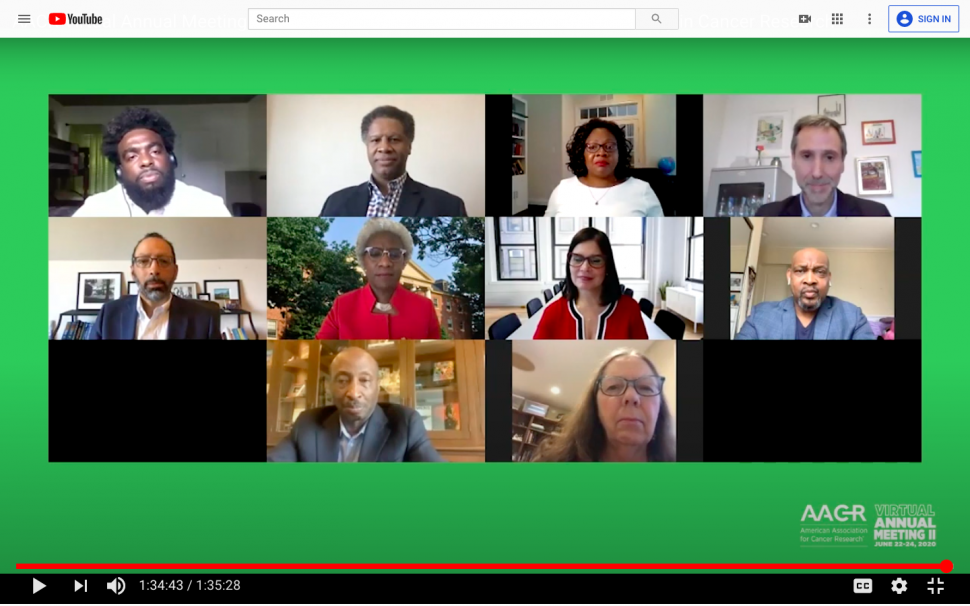AACR Virtual Annual Meeting II: Panel Discusses Racism and Racial Inequities in Cancer Research
As a scientific organization focused on preventing and curing all cancers, the American Association for Cancer Research (AACR) embraces the core values of equality, diversity, and inclusion, and stands ready to confront and combat systemic racism and racial inequities.
Last week, during the AACR Virtual Annual Meeting II, AACR President Antoni Ribas, MD, PhD, FAACR, led a panel discussion, titled “Racism and Racial Inequities in Cancer Research.” The panel was convened to stimulate an open and frank discussion about this timely and important topic, leading to concrete steps and initiatives the AACR can take to eliminate racial inequity in all of its forms.
“Today we will dig into issues about which we have kept quiet for way too long because it was too difficult or too painful to talk about them,” said Ribas, who served as Program Chair for this year’s Annual Meeting. Ribas is professor of medicine at the David Geffen School of Medicine at the University of California Los Angeles (UCLA); director of the UCLA Jonsson Comprehensive Cancer Center Tumor Immunology Program; and director of the Parker Institute for Cancer Immunotherapy Center at UCLA.
The panel discussion, which can now be viewed on YouTube, is just one component of the AACR’s efforts to address racial injustices in cancer research. In the coming months, Ribas added, the AACR will hold a series of forums, form an AACR task force to address the topic, and publish additional blog posts and other communications that highlight what needs to be done to effect positive change.
Driven to achieve
Tuesday’s panel featured accomplished Black, Latina, and Native American cancer scientists and leaders from some of the nation’s preeminent cancer centers, pharmaceutical companies, and governmental agencies. Panelists, whether early-career researcher or seasoned leader, said they had sought advanced degrees in part to prove to themselves that they were worthy of respect from broader society.
Russell J. Ledet, PhD, served in the U.S. Navy before earning bachelor’s degrees in chemistry and biology. He earned a PhD in molecular oncology and tumor immunology, and is now a third-year medical student at Tulane University.
He is committed to a future as a physician-scientist. But he confessed, “I chased a medical education partially because I thought maybe this is what would make me valued by society as a whole.” He launched a group called The 15 White Coats in an effort to help young Black children see themselves as a potential part of the medical community.

John D. Carpten, PhD, director of the Institute of Translational Genomics and Professor at the University of Southern California Keck School of Medicine and chair of the AACR’s Minorities in Cancer Research Council, said he felt similar emotions as he built his career in cancer research. He said that the recent deaths of George Floyd, Breonna Taylor, Ahmaud Arbery, and others, have motivated him to actively work to erase racism.
“Racism is a hard word,” he said. “We say ‘diversity and inclusion’ because it sounds better, but we have to acknowledge racism if we are to make it better.”
Building a more diverse work force
“The undercurrent of racism has made it difficult for our brightest and best to think about going into cancer research,” said Judith S. Kaur, MD, professor of oncology and the medical director for Native American Programs in the Mayo Clinic Cancer Center at Jacksonville, Florida. That must change if we are to advance the pace of progress against cancer and other diseases, panelists said.
Levi Garraway, MD, PhD, chief medical officer and head of global product development at Genentech/Roche, said that greater diversity at corporations and medical institutions can help ensure that patients of all races and ethnicities are considered in the development of medical advances. Like many large corporations, his company employs a chief diversity officer. He knows that creating such a position is only a beginning.
“If you really want to make sustained change, you have to set goals, measure progress, and stay accountable,” said Garraway, who is a prior member of the AACR Board of Directors.
Governmental agencies also play an important role in developing a more diverse scientific work force, said Hannah Valantine, MD, MRCP, first Chief Officer of Scientific Workforce Diversity and Senior Investigator at the National Institutes of Health (NIH). The NIH’s MOSAIC program and FIRST program both aim to increase diversity within the ranks of scientific researchers.
The pain of health disparities
Despite decades of progress against cancer, which has cut the incidence and death rate for many types of cancer, minorities and other underrepresented groups have not fully benefited, often experiencing a steeper cancer burden than the white population.
These disparities are multifactorial, but often begin with a lack of access to screening and detection of cancer.

“We need to go back to cancer prevention and early detection,” said Marcia Cruz-Correa, MD, PhD, director of the Gastrointestinal Oncology Division at the Dr. Isaac Gonzalez Martinez Oncologic Hospital and professor at the University of Puerto Rico Comprehensive Cancer Center. She is a current member of the AACR Board of Directors and is the former chair of the AACR Women in Cancer Research Council. “Minorities more often present with cancer at an advanced stage, and that is often a result of not having the right test at the right time.”
As the medical community addresses racism, ensuring equal treatment and equal access to care for minorities is vital, panelists said.
Underrepresentation in clinical trials
Researchers have long been aware that minorities are underrepresented in clinical trials, the long-term studies that evaluate drugs for safety and efficacy. This underrepresentation is among the numerous causes of cancer health disparities. It also has deep roots in systemic racism, panelists said.
Kenneth Frazier, chief executive officer of Merck & Co., said the reluctance of many Black Americans to participate in clinical trials stems from historic cases of unethical treatment.
“After a long history of abuse, some people are wary of clinical trials,” he said. “They are not sure if we are doing something forthem or doing something tothem.” Further, he said that clinical trial organizers could establish more partnerships with minority investigators as a means of building trust among potential clinical trial participants.
Lola A. Fashoyin-Aje, MD, MPH, deputy division director of the Division of Oncology-3 in the Office of Oncologic Diseases at the U.S. Food and Drug Administration (FDA), acknowledged that when clinical trials enroll mostly white patients, regulators cannot fully know whether a drug will benefit patients from other racial or ethnic groups.
“It’s problematic that we are having to approve drugs that have not been fully tested across various ethnic groups,” she said. In her view, to get more minorities into clinical trials, clinical trial designers should consider changing some of the criteria that sometimes disqualify potential minority enrollees, such as comorbid conditions. She also urged Frazier and Garraway to develop concrete plans at their companies to increase minority enrollment in clinical trials.
Sounding the call to action
Several panelists noted that while the recent protests brought racism to the forefront of public consciousness, the conversation is not new.
“The issue isn’t that we don’t know the right thing to do,” said Robert Winn, MD, director of the Virginia Commonwealth University Massey Cancer Center and professor of Pulmonary Disease and Critical Care Medicine.“We’ve been prescribing equity since 1965, and in every decade since then. We don’t need to study and plan; we just need to do.”
To that end, Ribas asked the panelists to identify calls to action. Some key suggestions were:
- Work more frequently and more proactively with the nation’s Historically Black Colleges and Universities. “We need to devote more time and more resources to these institutions so that we can grow the cadre of minority researchers,” Carpten said.
- Increase minority representation on corporate and nonprofit boards, and on review panels for scientific journals. “If those in charge do not look like us, we miss out,” Cruz-Correa said.
- Be a mentor and a true friend to colleagues of color. “This doesn’t just mean having lunch from time to time,” Garraway said. “Invite them and their families into your circles.”
- Sponsor a minority colleague or student to attend a scientific conference.
- Read books that have addressed issues of racism within the medical community. Ledet recommended “Medical Apartheid” by Harriet A. Washington and “Black Man in a White Coat” by Damon Tweedy, MD.
- Draw understanding and motivation from current events. “Don’t let these recent events be in vain,” Winn said. “We can do better. We are being called to reclaim our best selves.”



